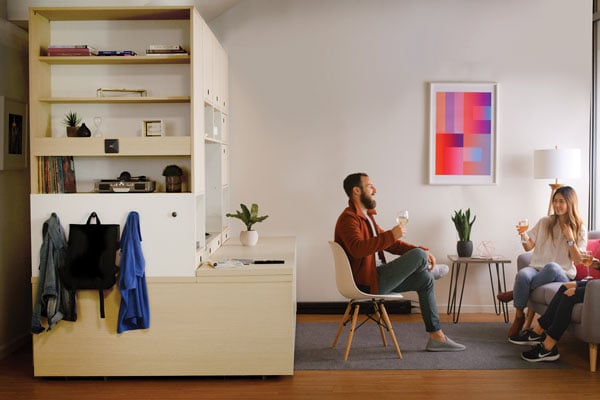Robotic Furniture

North American developers are animating small spaces with architectural robotics.
IT'S NO EXAGGERATION to say that robotics startup Ori is reimagining the potential of interior space. The company, which takes its name from “origami,” the Japanese art of paper folding, combines robotics, architecture and design to enable space to intelligently and effortlessly adapt to people and their everyday activities. Ori’s first family of robotic furniture systems is designed to create value for city dwellers by making small residential spaces “live” as though they are much larger, as well as by delivering value for developers through rent premiums and improved return on investment.

With a touch of the system interface, a swipe of the Ori mobile app or a voice command to Alexa or Google Assistant, the Ori Full and Queen systems quickly and easily transform a small living space from one function or mode to another. (They also can be operated manually in case of a power outage.) For example, a bedroom smoothly and quickly transforms into a comfortable living room, a spacious walk-in closet or a functional home office. Ori’s systems can also connect to a variety of smart home ecosystems and devices like thermostats, speakers, lights, etc., for additional ease of use and convenience.
The first family of Ori systems is designed for studio apartments between 300 and 600 square feet. Although the systems are currently available for purchase only by real estate developers, the company is exploring leasing and even a direct-to-consumer subscription model, and may introduce these options in the future. While their natural habitat is studios, the systems can also be integrated into one- or two-bedroom apartments, or into other living spaces, such as student housing. The most popular configurations are 92 inches wide by 139 inches long by 94 inches high for the full system and 98 by 151 by 94 inches for the queen system. The systems come with a standard 5- or 10-year warranty; additional coverage is available.
The systems have received UL approval and manufacture of the first commercial systems is expected to begin in March 2018. Ori has partnered with a national network of installers for professional installation and maintenance. The system is not permanently fixed to an apartment unit, so it can be easily installed or removed without drilling into walls or floors. Prices for the first family of systems start at $10,000.
Ori’s designers set out to create a robotic system that could solve the three main challenges of small space living by providing 1) a division of space, 2) a usable living area and 3) increased storage.
With Ori’s robotic furniture in place, studio units essentially function as one-bedroom apartments. The enhanced living experience it provides could encourage renters who would have once settled for a one-bedroom unit in a subpar building to instead opt for a studio in a prime building. This, in turn, allows real estate developers to optimize their unit mix in a way that greatly improves building economics. Ori’s systems also provide developers with a strong marketing tool, differentiating buildings as innovative places that offer a new type of urban residential experience.
Developer Samuels & Associates has installed Ori pilot (precommercial) systems in its Continuum development in Boston, a mixed-use project with 325 residential units and more than 35,000 square feet of retail space on the border of Harvard University’s southern campus and the booming North Alston neighborhood. According to one resident, “Living with Ori made life easier and more comfortable. I didn’t have to choose between a big bedroom and a big closet; I got both. It also made for a great conversation piece when friends visited and saw that I had a robotic wall.”
Samuels President Joel Sklar has seen firsthand how Ori is empowering residents to transform their living space: “Ori’s systems are a perfect fit for Samuels & Associates’ vision for Continuum. The effortless transition of its components allows residents to have full control of their homes and mold their spaces according to their wishes. Samuels & Associates is always looking for opportunities to work with pioneers in technology, such as Ori, and offer our residents alternative options for increased comfort and convenience.” The company has already ordered additional commercial systems.
The systems are currently being showcased in apartment buildings in 10 North American cities, including Brookfield Property Partners’ The Eugene in New York City; Bosa Properties’ Bluesky Chinatown in Vancouver; Skanska’s Watermark Seaport in Boston; Tandem Development’s MODE Logan Square Apartments in Chicago; and ZOM USA’s Monarc at Met3 in Miami. ZOM plans to install Ori systems into a stack of studio apartments in two of its downtown Miami apartment buildings, and has already installed a pilot system in a model unit.
Jason Haun, senior development manager at ZOM USA, agrees that Ori systems can benefit developers by letting them fit more studio units that look, feel and operate more like one-bedroom units into their floor plans.
To date, most of Ori’s pilot systems have been used for demonstration purposes. As developers begin installing production systems in 2018, they will be measuring lease-up pace and rental premium levels.
The company plans to expand Ori’s robotic technology into other solutions at different price points and for different markets. It is exploring ways to meet other challenges found in a variety of interior spaces, including office, hospitality and college settings. The possibilities are endless.
By Hasier Larrea, CEO and cofounder, Ori, hello@orisystems.com





